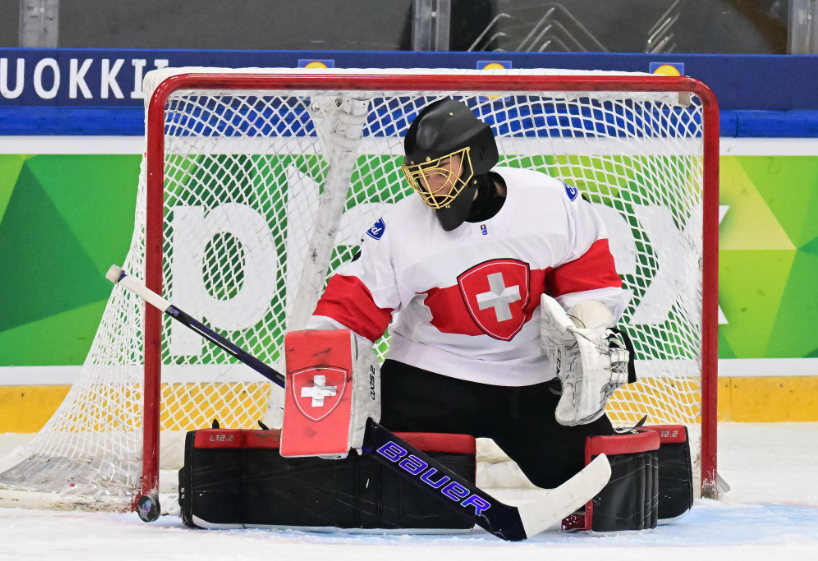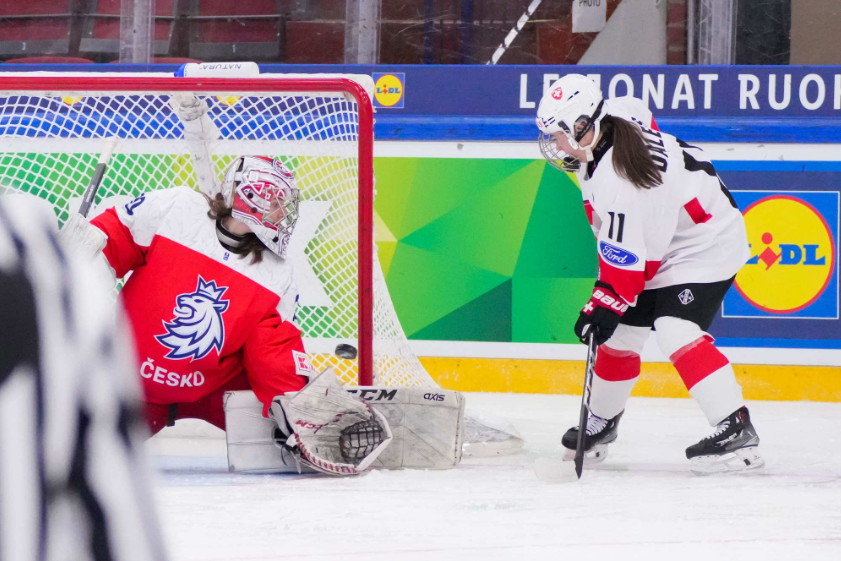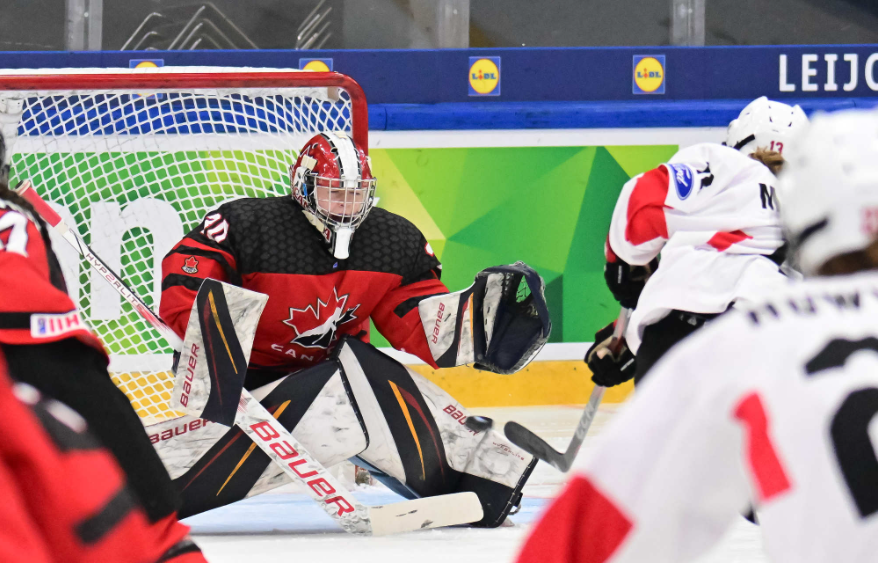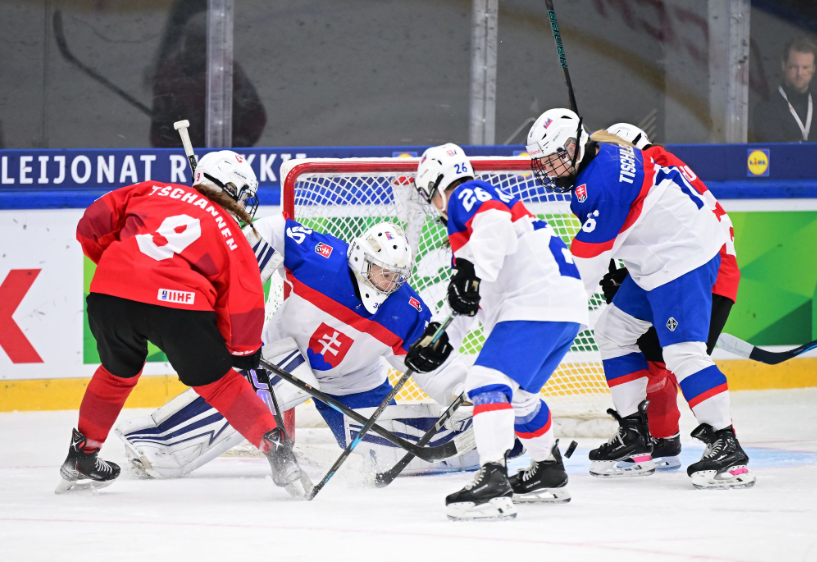Moving on Up: Switzerland After the Group Stage
With one win out of their first three games, Switzerland has work to do in the quarter-finals. What went wrong, and what went right?

Coming off yet another seventh place finish at the U18 level, Switzerland came into this tournament looking to take the next step. Through two games, they’ve recorded two regulation losses, making Tuesday’s game against Slovakia a must-win.
Game 1 vs Czechia
Switzerland’s first game of the tournament showed us why they’re here: they played smart and they worked hard to frustrate the Czech offense. They dogged Czechia’s players to force errors and took advantage of any lapses in concentration. This strong forecheck created a number of turnovers and led to several dangerous breakaways. In all, they put 24 shots on Czechia's goaltender and held the top seed in Group B scoreless for nearly 48 minutes. Even then, it took a power play and an empty net for Czechia to put one past Amaya Iseli.
The game remained scoreless until the third, when alternate captain Sonja Inkamp took a shot from a distance that deflected under Daniela Nováková’s glove. As the minutes ticked down, Switzerland focused on defensive play, forcing the Czechs to settle for long-distance shots that Iseli was able to shut down. The goal that finally got past her was an awkward deflection that she had no chance to stop.

The overtime goal was the result of giving a fraction of a second too much to a team that has a powerful forecheck. Defender Ilana Leibundgut, who otherwise had a great game, was bullied off the puck behind her own net by Adéla Pánková, who was able to pass to a teammate streaking towards the net. Iseli didn’t have time to challenge the shooter, and the puck went in over her shoulder.
Switzerland took six penalties in against Czechia, including a Too Many Players call and four for Tripping. Although the penalty kill played well, those are mistakes Switzerland cannot afford to take, particularly the tripping call with three minutes left in the game that allowed Czechia to tie the game. Aside from their breakaway chances, they allowed Czechia to keep them mostly shooting from the outside, and they were too often the loser in battles that came down to physicality.
Iseli could have earned player of the game honors for her work. She was constantly in a skirmish as Czechia planted players in front of her net to try and smack in rebounds, but she remained steady. Of the two goals that got by her, one was flukey and the other was a point-blank shot where the shooter had time to pick her spot.
But the player of the game for Switzerland was Norina Müller, and she earned it. Müller had a number of scoring chances and was noticeable both defensively and in terms of creating offensive chances for her line.
Game 2 vs Canada
In Switzerland’s second game of the tournament, the team continued to show us why they deserve to play at this level, but also provided insight into why they have placed seventh for so many years.
Although the game ended 5-1, this was not the kind of game we have seen in the past, where a struggling team avoids a worse result thanks to an amazing performance in net. The five goals that beat Amaya Iseli were good goals. Two were on the power play, one was a skill play from Chloe Primerano, last year’s MVP, and one was a snipe. Iseli did play a great game, but her teammates were not entirely in over their heads.
Confidence in Iseli may be what allowed them to do so. Switzerland was playing defense for a lot of the game as Canada controlled much of the puck possession and zone time, but the Swiss were not in shutdown mode. They forced Canada to work for their shots, giving Iseli time to get square and see the attacker.
But while the Swiss skaters’ confidence in their goaltender wasn’t an issue, confidence in themselves may have been. They allowed themselves to be rushed on shots and turned away from making plays even when they had the space to do so. This was particularly noticeable on power plays. Meanwhile, the one goal from Switzerland came as a result of instinct: Jael Manetsch intercepted a D-to-D pass and took two strides before loosing a beautiful shot to beat Amelia Wilkinson high blocker side.

The skill is there. But confidence and experience gave Canada the edge. Switzerland looked tired in the third, and although they continued to play a well-structured, patient defense, they did not put on much of an offensive threat.
Iseli was my player of the game for Switzerland. She looked calm in the crease and did an excellent job of staying square to initial shots and rebounds. She did scramble at moments later on, but that seemed to be due to fatigue, which one can hardly blame her for after seeing 60 shots in 60 minutes.
Game 3 vs Slovakia
Coming off two regulation losses during which they scored two goals in total, Switzerland needed a win. With eight teams in the tournament, they would be making the quarterfinal round regardless of the result, but it felt like they needed a confidence boost in the final game of the group stage to have any shot of progressing further.
Indeed, a lack of confidence seemed visible early in this game. After a day off to rest, Switzerland took the whole first period to warm up, looking at times less cohesive than they did against Canada. The early start– 10am local time– might have contributed. By the end of the first, they had taken three penalties, one of which carried over into the second. Another penalty ten seconds into the second period gave the Slovakians a minute and a half of 5-on-3, on which they capitalized.
Two impressive goals from Norina Müller in just over a minute put the Swiss back in the game and gave them the momentum to fight past a series of defensive lapses that Amaya Iseli prevented from finding the back of the net. The team fell into stride after that, and a good cycle allowed Laure Mériguet to score a great goal off a tip.
Switzerland allowed a goal by committing too much attention to the tournament’s current scoring leader Nela Lopušanová, but got one back quickly with a power-play goal that was as much skill as luck. The confidence was back and Switzerland’s skating had Slovakia on the back foot. Despite taking three consecutive penalties, Switzerland had several dangerous shorthanded chances, then earned a power play marker that was pure swagger.

With their goalie pulled, Gabriela Lačná completed her hat trick for Slovakia, but it was too late to make a difference and Switzerland pulled off the win.
Captain Naemi Herzig was named Switzerland’s player of the game, but I would have given it to Müller, whose individual effort shook her team out of a stupor and invigorated them to get back in the game.
Takeaways
Switzerland’s third game was not their best. I’d say that was their first game against Czechia. They play their best when they’re skating and passing well and playing good defense. The game against Slovakia provided them with a lot of tape to study on what not to do, particularly on defense, but they came out with the win and have earned the right to play Sweden, the second seed in group A, in the quarterfinals.
In this small sample size, Switzerland seems able to rise to the level of their competitor, but they are not looking unshakeable. They’ll have to work to establish the level of confidence they came into this tournament with to start Thursday’s game off strong. The good news is that while Sweden has been a strong team so far, they won two of their games in overtime. If Switzerland can get the engine going early and put Sweden off their game, they’ll have a good chance at surpassing another seventh place finish.





Comments ()